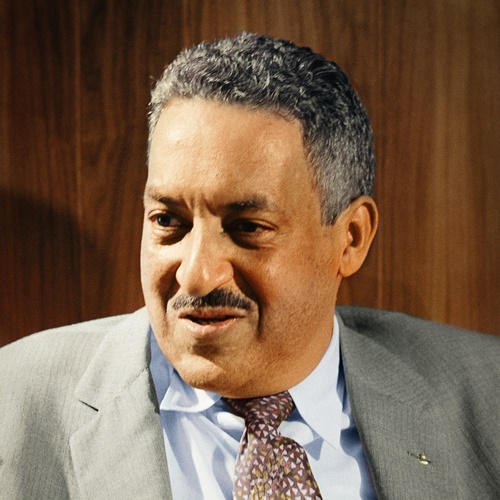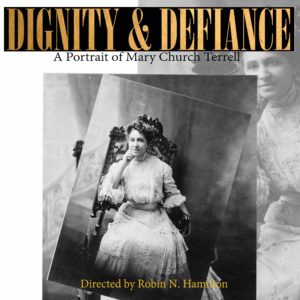Why a Supreme Court Justice Matters – Justice Thurgood Marshall
- Robin N Hamilton
- | February 10, 2024
Thurgood Marshall is best known for his achievements in the courts and for arguing the landmark 1954 case Brown v. Board of Education of Topeka.
Contents
WHO IS THURGOOD?
Thurgood Marshall was an influential figure in American history, particularly known for his significant contributions to the civil rights movement and the legal field. He was born on July 2, 1908, in Baltimore, Maryland, and passed away on January 24, 1993, in Washington, D.C.
Marshall graduated from Lincoln University in Pennsylvania in 1930 and then pursued a law degree at Howard University School of Law, where he excelled academically. Throughout his education, he faced racial discrimination, which fueled his commitment to fighting for equality and justice.
After completing his law degree in 1933, Marshall joined the National Association for the Advancement of Colored People (NAACP) as its chief counsel. Over the course of his career, he argued numerous cases before the United States Supreme Court, most notably Brown v. Board of Education in 1954. This landmark case led to the Court’s unanimous decision that racial segregation in public schools was unconstitutional, overturning the “separate but equal” doctrine established in Plessy v. Ferguson (1896).
Marshall’s legal victories extended beyond education, as he fought against racial discrimination in housing, employment, and voting rights. He played a crucial role in dismantling legal segregation and challenging systemic racism across various aspects of American society.
Thurgood Marshall’s legacy is one of immense importance and influence. His tireless efforts as a civil rights lawyer and Supreme Court Justice helped shape the legal landscape of the United States, laying the foundation for progress and equality. His commitment to justice and equality continues to inspire generations of activists and lawyers to this day.

EARLY LIFE OF MARSHALL
He was born to William Canfield Marshall and Norma Arica Williams in Baltimore, Maryland on July 2, 1908. His grandfather gave him the name Thoroughgood that was later abbreviated to Thurgood. Marshall’s father was a train porter, while his mother was a primary school teacher.
Marshall was raised by parents who instilled in him a devotion to the US Constitution and the rule of law.
Marshall learned to argue from his father, who took him and his brother to attend court proceedings and then debated whatever they had observed. After supper, the family discussed current affairs. Marshall stated that his father “molded me into a lawyer” despite the fact that he never encouraged him to become one. Marshall added that his father did that by “training me to debate, questioning my reasoning on each and every point, and by requiring me to justify every argument I made.”
MARSHALL’S WIFE AND CHILDREN
Thurgood Marshall was married twice in his lifetime. His first wife was Vivian Burey, whom he married in 1929. They had two children together, a son named Thurgood Marshall Jr. and a daughter named Thurgood Marshall II. Unfortunately, their marriage ended in divorce in 1955.
After his divorce from Vivian, Marshall married Cecilia Suyat in 1955. They remained married until his death in 1993. They did not have any children together.
Thurgood Marshall’s family played a significant role in supporting him throughout his career and activism. His children and second wife stood by his side during his legal battles and celebrated his achievements. They were witnesses to his dedication to civil rights and his commitment to fighting for justice in American society.
THE EDUCATION OF THURGOOD MARSHALL
Marshall enrolled in Baltimore’s Colored High and Training School (later renamed as Frederick Douglass High School) where he excelled academically, especially as a member of the debating society.
In his younger days, Marshall was known as mischievous. His most significant high school achievement, memorizing the whole United States Constitution, was really a teacher’s penalty for disrupting the classroom.
Marshall graduated from high school in 1926 and enrolled in Lincoln University, a predominantly Black university in Pennsylvania. There, he joined a prestigious student community that included Kwame Nkrumah, Ghana’s future president, poet Langston Hughes, and jazz vocalist Cab Calloway.
Marshall applied at the University of Maryland Law School after graduating from Lincoln with honors in 1930. While being academically highly qualified, Marshall was denied admission due to his race. This firsthand encounter with educational inequality had a lasting impact on Marshall and helped to shape the direction of his profession.
Marshall went to law school in Washington, D.C. rather than Maryland at another predominantly Black university, Howard University Law School. Marshall was placed under Charles Hamilton Houston, who was a pioneering civil rights lawyer and the chairman of Howard Law School at the time. Charles Houston was a legendary workaholic and very demanding lecturer.
“He would not be content until he went to a college dance and found all of his students sitting around the wall reading legal books instead of partying,” Marshall said of Houston.
Marshall graduated from law school in 1933, finishing first in his class. After graduating from Howard, Marshall established a private practice law firm in Baltimore.
THURGOOD MARSHALL’S LAW CASES
Murray v. Pearson
Marshall’s first big court win came in Murray v. Pearson in 1935, when he and his mentor Houston successfully sued the University of Maryland for refusing a Black candidate admittance to its law school on the basis of race.
Chambers v. Florida
Marshall’s first Supreme Court triumph came in Chambers v. Florida (1940), when he attempted to defend four Black men accused of murder based on statements taken from them by police.
Allwright v. Smith
Another significant Supreme Court win for Marshall occurred in the 1944 case of Smith v. Allwright, under which the Court overturned the Democratic Party’s practice of whites-only primaries in several Southern states.
Brown v. Board of Education
Marshall’s greatest triumph as a civil-rights advocate was his success in the classic 1954 Supreme Court decision Brown v. Board of Education of Topeka. The class-action lawsuit was filed on behalf of many Black parents in Topeka, Kansas, whose children were forced to attend all-Black segregated schools. In Brown v. Board, one of the most important verdicts of the twentieth century, Marshall confronted the legal underpinning of racial segregation, the doctrine of “separate but equal,” established by the 1896 Supreme Court decision Plessy v. Ferguson.
The State Supreme court declared on May 17, 1954, that “separate educational facilities are inherently unequal,” and so racial segregation in public schools violated the 14th Amendment’s equal protection provision.
Brown v. Board laid the legal groundwork and supplied much of the motivation for the American Civil Rights Movement that unfurled over the next decades. Simultaneously, the decision established Marshall as one of America’s most accomplished and recognized lawyers.
CIRCUIT COURT JUDGE AND SOLICITOR GENERAL
Marshall issued over 100 judgments as a circuit court judge during the following four years, none of which were overturned by the Supreme Court.
In 1965, Lyndon B. Johnson, Kennedy’s successor, appointed Marshall as the first Black U.S. solicitor general; a position where he was the attorney designated to represent the government before the Supreme Court. During his two years as Solicitor General, Marshall won 14 of the 19 cases he argued before the Supreme Court.
MALCOLM X AND MARTIN LUTHER KING JR.
Marshall is regarded as one of the finest and most influential personalities in the American civil rights movement, with Martin Luther King Jr. and Malcolm X. Many would argue that among these three men, Marshall was likely the most influential in the movement’s progress toward racial justice.
Marshall’s tactic of addressing racial inequalities through the courts offered a third approach to achieving racial justice, one that was more realistic than King’s lofty speech and less controversial than Malcolm X’s militant separatist.
MARSHALL’S DEATH AND ENDURING LEGACY
Marshall died of a sudden heart attack in 1993, at the age of 84. In honor of Marshall, Texas Southern University’s law school, which was named and acknowledged as the “Thurgood Marshall School of Law” in 1978, focuses on teaching and training minority law students. Each year, the university ranks among the top 5 in the nation in proportion to the number of Black law graduates.
Furthermore, the Thurgood Marshall College Fund, which was created in 1987, provides financial assistance to almost 300,000 students who attend predominantly Black institutions, universities, teaching hospitals, and law schools.
MARSHALL’S QUOTES
Some of his famous quotes are listed below:
1. “A man can make what he wants of himself if he truly believes that he must be ready for hard work and many heartbreaks.”
Thurgood Marshall
2. “I’m the world’s original gradualist. I just think ninety-odd years is gradual enough.”
Thurgood Marshall
3. “Truth is more than a mental exercise.”
Thurgood Marshall
4. “The process of democracy is one of change. Our laws are not frozen into immutable form, they are constantly in the process of revision in response to the needs of a changing society.”
Thurgood Marshall
5. “You do what you think is right and let the law catch up,”
Thurgood Marshall
6. “Certain people have a way of saying things that shake us at the core.”
Thurgood Marshall
7. “When the prison gates slam behind an inmate, he does not lose his human quality; his mind does not become closed to ideas; his intellect does not cease to feed on a free and open interchange of opinions; his yearning for self-respect does not end; nor is his quest for self-realization concluded.”
Thurgood Marshall
8. “Each of you, as an individual, must pick your own goals. Listen to others, but do not become a blind follower.”
Thurgood Marshall
9. “What each of us must come to realize is that our intent always comes through.”
Thurgood Marshall
10. “We got here because somebody – a parent, a teacher, an Ivy League crony or a few nuns – bent down and helped us pick up our boots.”
Thurgood Marshall
11. “I never worked hard until I got to the Howard Law School and met Charlie Houston… I saw this man’s dedication, his vision, his willingness to sacrifice, and I told myself, ‘You either shape up or ship out.’”
Thurgood Marshall
12. “My father had a flat rule. He believed that every man’s house was his castle. He had a flat rule: no man could come in his house without his permission.”
Thurgood Marshall
13. “If the First Amendment means anything, it means that a state has no business telling a man, sitting alone in his house, what books he may read or what films he may watch.”
Thurgood Marshall
Marshall’s quotes on Racism
15. “I wish I could say that racism and prejudice were only distant memories. We must dissent from the indifference. We must dissent from the apathy. We must dissent from the fear, the hatred and the mistrust…We must dissent because America can do better, because America has no choice but to do better.”
Thurgood Marshall
16. “The measure of a country’s greatness is its ability to retain compassion in times of crisis.”
Thurgood Marshall
17. “Our whole constitutional heritage rebels at the thought of giving government the power to control men’s minds.”
Thurgood Marshall
18. “Racism separates, but it never liberates. Hatred generates fear, and fear once given a foothold; binds, consumes and imprisons. Nothing is gained from prejudice. No one benefits from racism.”
Thurgood Marshall
19. “Lawlessness is lawlessness. Anarchy is anarchy is anarchy. Neither race nor color nor frustration is an excuse for either lawlessness or anarchy.”
Thurgood Marshall
20. “We deal here with the right of all of our children, whatever their race, to an equal start in life and to an equal opportunity to reach their full potential as citizens.”
Thurgood Marshall
Thurgood Marshall’s Role As The First Black Supreme Court Justice
Thurgood Marshall’s appointment to the Supreme Court in 1967 marked a significant moment in American history, representing a crucial step towards racial equality within the nation’s highest legal institution. Marshall had already established himself as an exceptional legal mind before ascending to the Supreme Court, primarily as a pioneering civil rights attorney and the lead strategist behind the landmark Brown v. Board of Education case in 1954.
President Lyndon B. Johnson’s groundbreaking nomination of Marshall represented a departure from the Court’s historical lack of diversity. As the first black Supreme Court Justice, Marshall brought a wealth of legal expertise and an unwavering commitment to the principles of justice and equality to the Court. His appointment not only shattered racial barriers but also infused the Court with a fresh perspective that reflected a broader demographic experience.
Marshall’s presence on the Supreme Court had a profound impact on the legal landscape of the United States. Beyond being a symbol of progress, Marshall was a force for change within the Court. His sharp legal mind and commitment to the principles of the Constitution positioned him as a vocal advocate for civil rights and social justice. Marshall’s jurisprudence emphasized the evolving nature of the Constitution and its application to contemporary issues.
During his tenure, Marshall played a crucial role in several key decisions that furthered the cause of civil rights. Notably, in 1971, he authored the majority opinion in Swann v. Charlotte-Mecklenburg Board of Education, affirming the authority of federal courts to oversee and remedy school desegregation. Marshall consistently advocated for the elimination of racial discrimination and the protection of individual liberties.
One of Marshall’s enduring legacies is his unwavering commitment to protecting the rights of the accused. He consistently upheld the Fourth Amendment’s protection against unreasonable searches and seizures, emphasizing the importance of preserving individual privacy in the face of law enforcement actions.
Marshall’s influence extended beyond the courtroom. He used his position to mentor and guide his colleagues, fostering a spirit of camaraderie and collaboration on the Court. Marshall’s ability to build consensus and communicate effectively made him an influential figure in shaping legal decisions and establishing a more inclusive and equitable legal system.
Marshall’s Contributions To Legal Education And Advocacy
Marshall’s involvement in legal education and mentorship was a significant part of his legacy. He was a graduate of Howard University School of Law and returned to the school as a professor in 1933. He was an influential figure in the development of the school’s civil rights curriculum and mentored numerous law students who went on to become prominent civil rights lawyers themselves. Marshall believed in the importance of training the next generation of lawyers to fight for civil rights and social justice, and his impact on legal education continues to be felt today.
Marshall’s advocacy for civil rights and social justice extended far beyond the courtroom. He was a prominent figure in the civil rights movement and worked tirelessly to advance the cause of racial justice. He served as the executive director of the NAACP Legal Defense and Educational Fund, where he helped to develop legal strategies to challenge segregation and discrimination. Marshall was also a vocal advocate for voting rights and was instrumental in the passage of the Voting Rights Act of 1965.
In addition to his work on civil rights, Marshall was also an advocate for social justice issues. He was a vocal opponent of the death penalty and believed that it was a form of cruel and unusual punishment. He also worked to address issues of poverty and inequality and believed that the law could be used as a tool to effect social change.
Marshall’s influence on future generations of lawyers and activists is immeasurable. His commitment to civil rights and social justice inspired countless individuals to pursue careers in law and advocacy. Marshall was a role model for many young lawyers who saw in him the potential for using the law as a tool for social change. His influence can be seen in the work of countless civil rights lawyers and activists who have followed in his footsteps.
FAQs:
What is Thurgood Marshall best known for?
Thurgood Marshall is best known for his achievements in the courts and for arguing the landmark 1954 case “Brown v. Board of Education of Topeka”.
Was Thurgood Marshall half white?
Marshall’s parents were of mixed heritage
Why is Thurgood Marshall important?
Thurgood Marshall is important because of his efforts to end prejudice against African Americans and by changing laws throughout the United States
Who was the first Black man to be named to the Supreme Court?
Thurgood Marshall was the first African American appointed to the Supreme Court
Citations
https://en.wikipedia.org/wiki/Thurgood_Marshall#Marriage_and_family
https://www.naacpldf.org/about-us/history/thurgood-marshall/
http://thurgoodmarshall.com/
Films
Recent Posts
Recent Posts
- Why a Supreme Court Justice Matters – Justice Thurgood Marshall
- Undefeated African-American Leaders
- Summary of the Abolitionist Movement
- Stokely Carmichael – Who was Behind Black Power and Why He Mattered
- Rosa Parks
- Racism in 1920
- Niagara Movement (1905-1909)
- Nat Turner’s Rebellion-Early Life-Death & Complex Legacy
- MOSES OF HER PEOPLE – HARRIET TUBMAN
- Mary Church Terrell House


